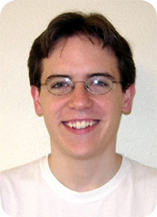|
||||||||||||||||||||||||||||||||||||||||||||||||||||||||||||||
|
Graduate Student Wins IBM PhD Scholarship
Lawrance has published eight fully refereed papers (two journal and six papers at selective conferences), has a ninth submitted, and has participated both as a team member and as a leader in experiment design, in the programming required to prepare prototypes, in the statistical analysis of the data, in interpreting the results, and in writing and publishing the results. Together with his advisor Margaret Burnett, he has been collaborating with IBM researchers for about two years. Four of his papers have been co- authored with IBM collaborators, and there are several more in the pipeline. “Joey has been a wonderful student and will be a wonderful researcher in his future career,” said Burnett. “He has a wonderful attitude about learning, reads everything from economics to mathematics to psychology, and his curiosity and interests know no bounds.” Lawrance’s research niche is where humans and programming practices meet. His dual background in computer science and psychology provide a strong background for his dissertation research, which is to investigate the relationship of information foraging theory on programmers’ behavior when performing debugging and maintenance. His results are beginning to show compellingly that his information foraging model can predict where programmers will need to navigate, using mathematical techniques that compute “scent” in bug reports and then propagate it along topological paths in code using spreading activation methods. This result promises to inform tools to save significant time in helping programmers track down bugs.
|
|||||||||||||||||||||||||||||||||||||||||||||||||||||||||||||

